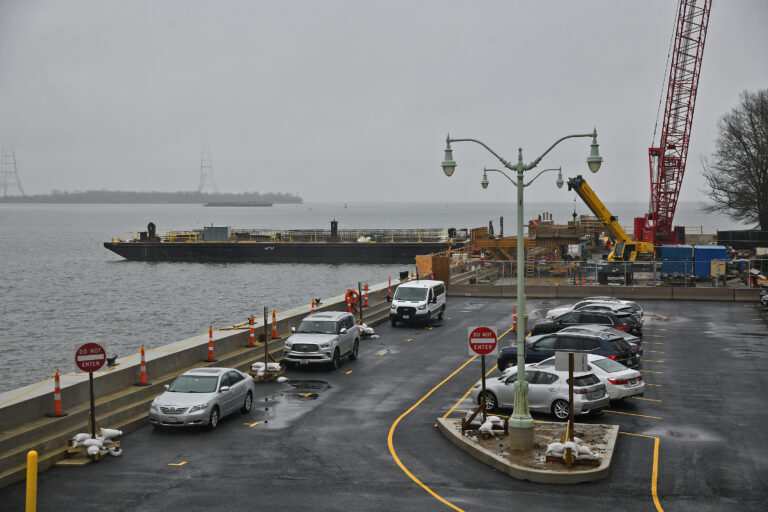
The new sea wall along the U.S. Naval Academy’s Farragut Field meant to bolster its resilience against climate change is on track to be completed before the end of the year.
The sea wall project, designed to provide structural protection against flooding and sea level rise, is approximately 80% complete, said Madelyn Flayler, a public affairs officer for Naval Support Activity Annapolis, which handles public works at the academy.
Specific repairs include construction of a new sheet pile bulkhead outboard of the existing bulkhead. A tieback system, which reinforces the support system, will be built inland of the existing structure for lateral stability, according to a news release from the academy.
The sea wall is at the eastern corner of the academy grounds where the Severn River meets Spa Creek and the Annapolis Harbor, a location that makes it subject to localized flooding from high tides and sustained winds blowing from the south and east.
Triton Light, the iconic navigational beacon situated on the seawall, has not been in operation during construction. The light will be reinstalled at its original location and raised to the new elevation for visibility above the new wall, Flayler said.
Concerns with the Naval Academy’s sea wall date back several years. A prior assessment of the condition of the academy’s facilities found that the existing steel sheet piles in bulkheads at Farragut Field and the east wall of Santee Basin were showing increased deterioration, with corrosion holes developing below the concrete pile caps.
Officials broke ground on the new sea wall in November 2022, two months after the Naval Facilities Engineering Systems Command Washington awarded a $37.5 million contract to Cianbro Corporation for the repairs.
The project is the first in a series of efforts outlined in a Military Installation Resiliency Plan, which aims to mitigate the effects of flooding and combat climate change, rising sea levels and changing weather patterns affecting the waterfront grounds.
The plan is set to be implemented over the next 40 years. Short-term projects slated for planning, design and execution over the next four years include protection of existing utility tunnels, stormwater management, waterfront infrastructure and shore protection.
A stone revetment, or retaining wall, along Turner Joy Road, which runs along the land inside of the sea wall and around Farragut Field, is also vulnerable to impacts from strong weather. Though it’s listed as a short-term project, design has not yet started.
NSA Annapolis is “continually evaluating” the sequencing of projects at the academy, Flayler said. Numerous other resiliency projects are being actively planned and designed, with a goal of executing multiple projects within the next decade.
Repairs and flood protection on Ramsay Road are on schedule to be awarded this fiscal year, she said. The project will preserve the columbarium near the Naval Academy Cemetery and protect a primary transit route on the upper portion of the yard.
Over the last 95 years, the relative sea level in Annapolis has risen more than a foot, increasing the frequency and severity of flooding. A storm that swept through the region in January marked the third-worst flooding in the city’s history, with floodwaters reaching five feet over normal levels.
Efforts to protect downtown Annapolis from flooding are underway as well.
In early February, the Annapolis Planning Commission approved site plans for the redevelopment of City Dock, which proposes turning the parking area from Craig Street to Susan Campbell Park into a raised earthen berm to hold back water.
Flood barrier gates extending from just beyond the Naval Academy, bordering Ego Alley and stopping at the newly proposed Donner Park are also included in the city’s plan.
___
© 2024 Capital Gazette
Distributed by Tribune Content Agency, LLC.
0 comments :
Post a Comment